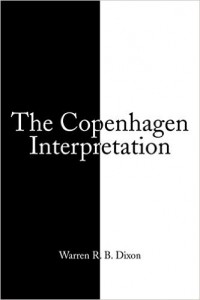Title: The Copenhagen Interpretation
Author: Warren R. B. Dixon
Publisher: XlibrisUS
ISBN: 9781493161461
Pages: 282
Genre: Fiction/Literary
Reviewed by: CC Thomas
Buy on AmazonPacific Book Review
Author Warren R. B. Dixon walks into the past in this book, The Copenhagen Interpretation. While most books about Germany invariably target either WWI or WWII, this book leaps forward and sets this tale of mystery and love during the Reagan administrative years. While American political policies aren’t central to the plot, “Americanization” is very much the focus, especially when viewed through the eyes of the world.
The key focus of the story, though, is not actually the setting. After a few chapters, the setting could be the present time or even during those WWI and WWII years. What really stands out to the reader is the depth of the characterization. Each character in the story is told with painstaking detail, so much so that it’s rather hard to believe they don’t actually exist. Normally, writers will make the main characters that should be either loved or hated. This author doesn’t go with that clichéd route. Instead, Dixon paints his characters the way an artist would an oil painting. There are layers and depths that reveal themselves slowly through the reading. What was most enjoyable is the glaring issues and problems these characters faced. Of course, that’s what gives them the credibility to seem like real people.
For example, I have an Uncle Warren. He’s a delightful old man with one huge flaw. Every Christmas, he brings me cans of tuna. I have no idea why. At first, it was funny and quirky, then endearing, now confusing and maddening. It makes me ponder those cans for months. What does he mean by this gift? The characters in the book follow this same kind of characterization. A seemingly insignificant detail will be revealed, then that detail will be peeled back in the layers like an onion. There’s more going on than meets the eye. The main character, Austin Kellogg, is rather like Uncle Warren. He has layers that reveal more of his character through each chapter and getting to know him is exactly like getting to know a real person. Each encounter and conversation reveals to you what kind of person he is. At times, like Uncle Warren, Kellogg is delightful, funny, quirky, endearing, confusing, and maddening. He often does things as strange as giving away cans of tuna, yet seeing his thought processes are fascinating. However, the author doesn’t stop at Kellogg, but spreads that around to all of the characters. Many whom you think are minor will later reveal themselves to be drastically important in some twist of the plot.
Another really important characteristic of the book is the “Americanization” of the plot, conversations, and characters. Perhaps because Kellogg is a thinking character, that rubs off on the reader. Kellogg questions every nuance of his life and queries whether his answers or behavior is a true reflection of his feelings and thoughts as a human, or does his American nationality persuade his true responses. It’s a really interesting way to consider the plot and the characters in this book and will have the reader thinking through each point in the plot as being hidden with layers of meaning.
As for the plot, it has as many layers and levels which are peeled like an onion. Kellogg, for all his considerations, can’t see the truth of the people in front of him. This creates a story full of unrequited love at inopportune moments. Dixon has created an interesting and thought-provoking read that will have you thinking all the way through the story and will leave you with many lingering thoughts afterwards.


